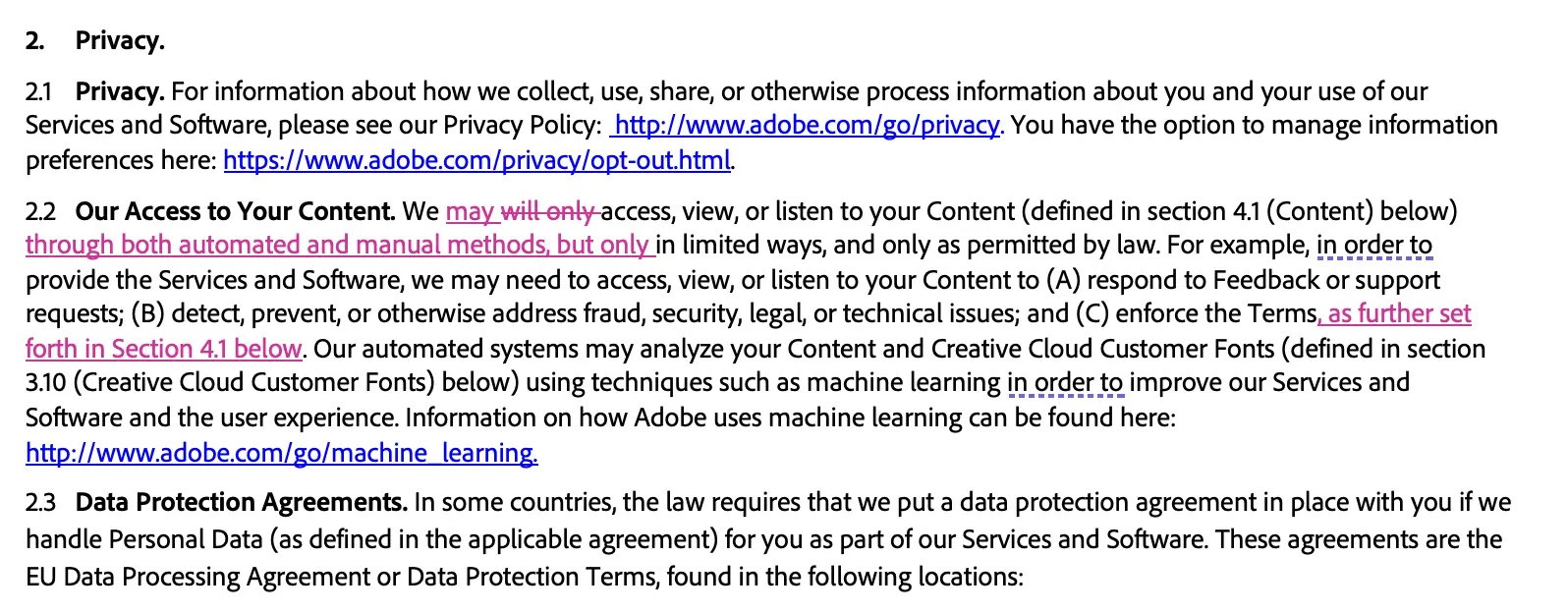Adobe has clarified its terms and conditions after users expressed outrage when they were denied access to its products without agreeing to an updated Terms and Conditions document.
The controversy stemmed from a provision in the document stating that Adobe could access users’ content using both “automated and manual methods.”
The updated terms read:
“We’ve made some changes to the Adobe General Terms of Use regarding the use of Software and Services, including:
• Clarified that we may access your content through both automated and manual methods, such as for content review (Sections 2.2 and 4.1)”
Users criticized this decision and declined to accept the change, with some noting that they are involved in projects governed by non-disclosure agreements (NDAs), which prohibit sharing information with unauthorized parties.
Here it is. If you are a professional, if you are under NDA with your clients, if you are a creative, a lawyer, a doctor or anyone who works with proprietary files – it is time to cancel Adobe, delete all the apps and programs. Adobe can not be trusted. pic.twitter.com/LFnBbDKWLC
— Wetterschneider (@Stretchedwiener) June 5, 2024
However, in a blog post, Adobe called the changes “a routine re-acceptance” of those terms to Adobe Creative Cloud and Document Cloud customers. It stated: “We have received a number of questions resulting from this update and want to provide some clarity.
“We remain committed to transparency, protecting the rights of creators, and enabling our customers to do their best work.”
What is different in Adobe’s terms and conditions
Adobe announced, “The focus of this update was to be clearer about the improvements to our moderation processes that we have in place. Given the explosion of Generative AI and our commitment to responsible innovation, we have added more human moderation to our content submissions review processes.”

Originally, the terms regarding access to user content stated, “We will only access, view, or listen to your Content…through both automated and manual methods, but only in limited ways, and only as permitted by law.” This statement was later modified to “may” access content, which raised concerns among users.
In addition, Adobe added, “To be clear, Adobe requires a limited license to access content solely for the purpose of operating or improving the services and software and to enforce our terms and comply with law, such as to protect against abusive content.”
When Adobe applications and services may access content
Adobe said that its apps and services require access to user content to fulfill their intended functions, such as opening and editing files, creating thumbnails, and generating previews for sharing.
This access also allows advanced cloud-based features like Photoshop Neural Filters, Liquid Mode, and the Remove Background tool. Users interested in learning more about how their content is managed and how they can control its use can find detailed information on Adobe’s dedicated help page.
When content is processed or stored on Adobe’s servers, the company says that it uses various technologies and processes. These include escalation to manual (human) review to screen for illegal or abusive content, such as activities that show spam or phishing.
It reiterated that it does not train its Firefly Gen AI models on customer content. Firefly generative AI models are reportedly trained on a dataset of licensed content, such as Adobe Stock, and public domain content where copyright has expired. Adobe then stressed that it will “never assume ownership of a customer’s work.”
Featured image: Ideogram


















